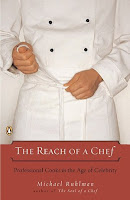 Writer and independent scholar Jonathan Lyons spent twenty years as a foreign correspondent and editor for Reuters, much of it in the Islamic world. His research and writing focuses largely on the shifting boundaries between East and West.
Writer and independent scholar Jonathan Lyons spent twenty years as a foreign correspondent and editor for Reuters, much of it in the Islamic world. His research and writing focuses largely on the shifting boundaries between East and West.He is the author, most recently, of Islam Through Western Eyes: From the Crusades to the War on Terrorism. Earlier works include The House of Wisdom: How the Arabs Transformed Western Civilization, and (with Geneive Abdo) Answering Only to God: Faith and Freedom in Twenty-first-Century Iran. He has a doctorate in sociology and carries out his research in the Old World splendor of the Library of Congress.
Last month I asked Lyons what he was reading. Here is his reply:
I am taking something of a detour from my engagement with the Muslim world to apply some of the same analytical approaches to early American history, specifically to the question of how America became the world’s leading technologicalLearn more about Islam Through Western Eyes at the Columbia University Press website, and visit Jonathan Lyons's website and blog.power. As a result, much of my recent reading has addressed colonial and British intellectual history. But I also try to read novels, both classics and newer works, when I can.
I have several historical books on the go right now. These include Ron Chernow’s impressive Washington: A Life, which Gordon S. Wood’s notice in the NYRB called “the best, most comprehensive, and most balanced single-volume biography of Washington ever written.” It is instructive to watch Chernow at work, as he painstakingly fashions an accessible and human story from the man behind the emotional mask.
Of a more specialist nature are a number of works on the history of science, largely revolving around Benjamin Franklin. I recently finished James Delbourgo’s A Most Amazing Scene of Wonders: Electricity and Enlightenment on Early America, which captures the bodily experience of early American science. In Benjamin Franklin and the Politics of Improvement, Alan Houston stresses the “identification of truth and utility, of natural philosophy and social theory” in pre-revolutionary colonial thought.
Of special notice was my recent re-reading of James Simpson’s Burning to Read: English Fundamentalism and Its Reformation Opponents. Simpson unpacks the culture of reading in the 16th century to examine the roots of religious fundamentalism. Along the way, he takes apart the convention that Protestant reading, now freed of the strictures of a hierarchical Church, naturally led to European liberalism.
Robert Middlekauff’s Benjamin Franklin and His Enemies provides a welcome counterpoint to the avuncular popular image of Ol’ Ben by focusingon the central antagonists in Franklin’s dramatic lifetime.
For fun I try into dip into novels as time permits. After reading Haruki Murakami’s The Wind-Up Bird Chronicle, I am exploring the author’s other works. And then there is my decennial encounter with Moby Dick.
The Page 99 Test: Islam Through Western Eyes.
--Marshal Zeringue

































